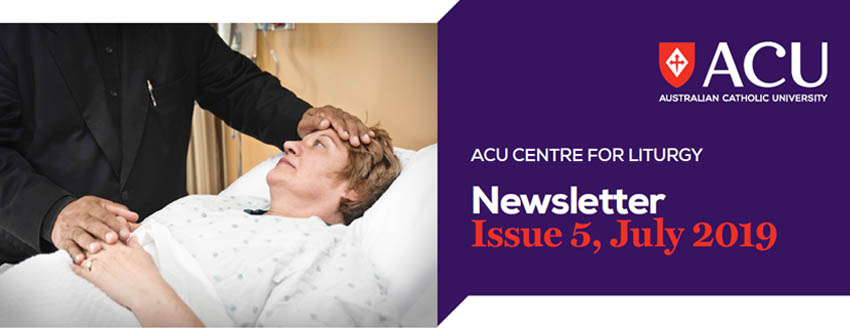

Brokenness is something we try to avoid
“It’s broken” can mean it no longer functions, loses value, ceases to be worthy of attention. Feeling broken is an experience of weakness, wanting, vulnerability – our soft underbellies are exposed, our fears are revealed. Weakness is destabilising, de-centering and discomforting. We can find ourselves weakened when illness encroaches on or abruptly interrupts our everyday plans, or when an error in judgment or a deliberate, uncaring choice puts us out of right relationship with our God and community and into a state of sin. At such times, our brokenness seeks to be whole; our hollowness seeks to be filled; our illness seeks healing or acceptance; our alienation seeks belonging. The Catholic sacraments of Healing – Anointing of the Sick and Penance/Reconciliation are a remedy for those times when we find ourselves broken, weak. God’s healing and merciful grace is on offer to us if we ask for and open ourselves to its promise. In this newsletter’s two feature articles, Julie Upton recounts the power of Anointing of the Sick and Paul Crowley highlights the forgiveness available through the Sacrament of Penance, where in response to our brokenness and weakness God grants the gifts of hope, healing and wholeness.
Professor Clare V. Johnson
Director, ACU Centre for Liturgy Professor of Liturgical Studies& Sacramental Theology, Faculty of Theology & Philosophy
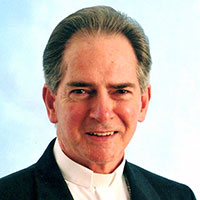
Among the most vivid stories in the gospels are the accounts of Jesus healing and forgiving.
haemorrhages for twelve years touches Jesus’ cloak and is healed (Mark 5:25-34). A man who had been blind from birth bears witness that Jesus had cured him. “He put mud on my eyes. Then I washed, and now I see.” (John 9:15) Sometimes the physical healing is linked with the spiritual healing of forgiveness, as when Jesus says to a paralysed man, “Get up and walk” and “Your sins are forgiven.” (Matthew 9:2-8) In the sacraments, the church continues the ministry of Jesus. As Pope Leo the Great said, “What was visible in Christ has passed over into the sacraments of the church.” (Sermon 74) In the sacraments of penance and the anointing of the sick, we can continue to feel the healing and forgiving touch of Jesus.
Bishop Paul Bird CSsR
Bishop of Ballarat, Vic; MA (liturgy), The Catholic University of America; member of the Bishops Commission for Liturgy
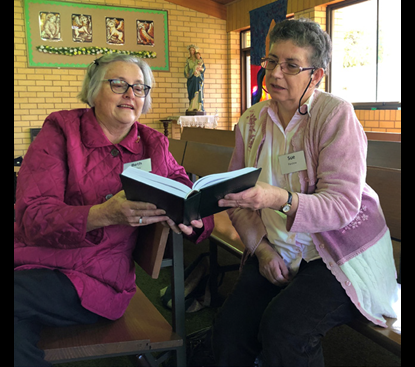
On the first weekend of June, Ms Sharon Boyd and Dr Jason McFarland led two successful days of liturgical formation at St Fergal’s Parish in Hay, NSW, for the Diocese of Wilcannia-Forbes. With more than 20 participants from across the diocese, the weekend provided essential training for those lay leaders who need to take on more responsibility in their parish communities where a priest cannot always be present, and where priests and deacons rely heavily on lay parishioners to prepare, facilitate, and in some cases lead liturgical celebrations.
This important work was possible thanks to a generous donation to the ACU Centre for Liturgy for the support of our work in rural and under-resourced dioceses. Please consider making a similar tax-deductable donation, large or small, to support our work, so that the centre can continue to offer pastoral formation in dioceses like Wilcannia-Forbes and continue enriching the liturgical life of the Church in Australia. Information on how to donate can be found below.
On 8 –12 July, Dr Jason McFarland offered a new 600-level unit on liturgical theology at the Strathfield Campus of ACU. Distinguished liturgical theologians Kevin Irwin of The Catholic University of America and Judith Kubicki of Fordham University offered guest lectures as part of the unit.
Professor Clare Johnson engaged a group of enthusiastic postgraduate students in an intensive unit studying liturgical music at ACU’s Melbourne Campus on 8 – 12 July. This unit runs every two years as part of the Graduate Certificate in Theological Studies (Liturgy) and invites students to consider the theological, liturgical and musical principles that undergird good liturgical music praxis in our Church today.
At the start of 2019 the ACU Centre for Liturgy launched the Liturgy Nexus for Schools. Teachers and those tasked with the responsibility of preparing liturgies often need enhanced practical liturgical knowledge so that they can help children and young people in Catholic schools to experience rich liturgies that nurture their spiritual and liturgical life. The Liturgy Nexus for Schools offers support and information to these teachers and is a ‘go-to’ place when teachers have questions about celebrating liturgies in Catholic schools.
www.acu.edu.au/LiturgyNexusSchool
To convey God’s Word well in liturgy requires specialised formation, careful preparation and practice. The Speaking Awesome Words training program forms lectors to proclaim the Word of God effectively and helps them to understand more about the readings they bring to life. This program benefits both experienced and beginning lectors, by focusing on techniques for effective proclamation informed by relevant aspects of theology, scripture, history, liturgy and spirituality, and includes a masterclass demonstration as well as vocal health and voice projection tips.
Venues where the program has been presented this year include: Reservoir, Bannockburn, and Kilmore (Vic) and Pambula/Bega, Eastwood and Punchbowl (NSW).
This two-hour training program can be run on a weeknight or a Saturday morning or afternoon. Express your interest online and we will be pleased to address any questions you may have or to tailor a bespoke extension of this program for your parish – Kippax ACT parish recently requested an extension session focused on building specific skills in individual lectors.
For almost 40 years now I have been teaching students about the Church’s ministry of healing through the sacraments of reconciliation and anointing of the sick.
Remembering that liturgy is the work of the people, we always discuss the scriptural, historical, theological and pastoral dimensions of the sacraments along with our personal experiences. Until recently I was never able to add a personal dimension to our conversations about anointing of the sick. However, when I was scheduled for a total hip replacement, I knew I wanted to receive the sacrament. I asked our pastor if he would anoint me before surgery, and so one morning after the parish Mass, he gathered people in a circle around me and celebrated the sacrament which at least one theologian has called “the forgotten sacrament” (see William J. Bausch, A New Look at the Sacraments (New London, CT: Twenty-Third Publications, 1983).
The multifaceted ritual: Pastoral Care of the Sick and Dying: Rites of Anointing and Viaticum includes sections on visiting the sick (including children); bringing communion to the sick in various settings; the sacrament of anointing of the sick outside of mass, within mass, or in a hospital; care of the dying, including a penitential rite and viaticum (communion for the dying); and rites for exceptional circumstances. These rites presume that care of the sick is the responsibility of the whole community, although a priest presides at the sacrament of anointing of the sick itself. Explore the rites and you will find a wonderful resource for prayer and ministry.
My own experience of receiving the anointing of the sick stayed with me long after the oil had seeped into my body, mind and spirit. It calmed me more than I expected, and I was confident that the Church’s prayer was not just strengthening me but also my surgeon for whom we prayed:
Catholics have grown spiritually in recent decades. Listening to the scriptures proclaimed in our own language, praying the psalms in response and singing God’s praises in songs and hymns most often based on Scripture has subtly but surely reshaped us. Rather than just measuring ourselves up against a list of commandments rooted in Mosaic Law, the Gospel message and particularly the Beatitudes are more often our spiritual measuring rod today. Into the stony darkness of those tiny confessionals where people, focused only on their failures, anonymously shed all their shameful sins, the bishops gathered at Vatican Council II spoke:
The rite and formulas [sic] for the sacrament of penance are to be revised so that they give more luminous expression to both the nature and effect of the sacrament (Sacrosanctum Concilium 72).
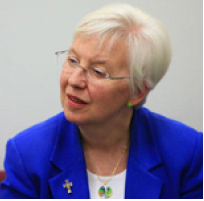 “Luminous expression!” It only stands to reason: if there is anything that unites us as a human community it is our propensity to sin. Jesus came to call sinners to himself, not the self-righteous, as we are reminded in the Gospel. Hidden away in darkened confessionals, ashamed to be seen in our true humanity, later-day Catholics were far from celebrating the forgiveness experienced through Jesus and with the Church. We are forgiven! This is cause for celebration—in the light not the dark. In 2 Cor 5:16-21 St. Paul reminds us that we ambassadors of Christ charged with the ministry of reconciliation. The only way to do that is by sharing our own experiences of the extravagant mercy of God.
“Luminous expression!” It only stands to reason: if there is anything that unites us as a human community it is our propensity to sin. Jesus came to call sinners to himself, not the self-righteous, as we are reminded in the Gospel. Hidden away in darkened confessionals, ashamed to be seen in our true humanity, later-day Catholics were far from celebrating the forgiveness experienced through Jesus and with the Church. We are forgiven! This is cause for celebration—in the light not the dark. In 2 Cor 5:16-21 St. Paul reminds us that we ambassadors of Christ charged with the ministry of reconciliation. The only way to do that is by sharing our own experiences of the extravagant mercy of God.
Sr Professor Julia Upton rsm
is Provost Emerita and Distinguished Professor of Theology at St John’s University, New York.
When the revised Rite of Penance was introduced in 1975 it presented three Rites of Reconciliation. What was significantly different from what had gone before was the communal focus of the Second and Third Rites.
The Rite of Penance also set out the important role that non-sacramental Penitential Celebrations can have in helping “to foster the spirit of penance within the Christian community” (Rite of Penance Introduction #37).
The celebration of the Word of God has a central place in the communal Rites of Reconciliation, and although restrictions have seen the Third Rite disappear, communal Second Rite celebrations continue in parishes and in schools.
Even so, after more than forty years of pastoral practice we are witnessing a shift away from full and proper celebrations of the Second Rite of Reconciliation. Clearly one factor is the decline in the availability of priests. It becomes difficult to maintain the balance between the communal celebration of the Word and individual confession when there is only one priest available.
In school settings, particularly in secondary schools, there is another constraint. When a Reconciliation celebration is planned, the school program usually only allows one period for a class celebration. Given that limitation and to allow time for individual confession, the choice is often made to minimise the celebration of the Word.
One consequence is the emergence of a “hybrid rite” of Reconciliation. Typically, the students gather in a suitable space and a teacher leads a guided reflection. Meanwhile the priest is available for those who wish to celebrate the Sacrament of Penance in what is frequently an abridged First Rite of Reconciliation.
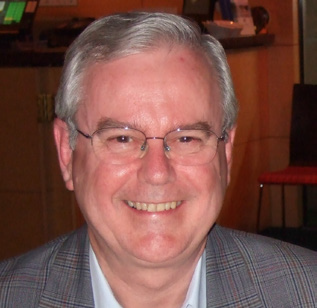
What is missing is the celebration of the Word of God that is at the very heart of the revised Rites. The guided reflection may include a reading from Scripture but it often fails to capture the communal call to conversion that is at the heart of the Second Rite. Where absent a priest, a better solution would be a teacher-led non-sacramental Penitential Celebration aimed at encouraging students to reach out for the sacrament themselves.
Perhaps now more than ever we need to rediscover how well-celebrated Penitential Celebrations of the Word can help communities to foster the spirit of penance and encourage people to go on to participate in the sacrament. By returning the focus to the Word of God and the call to conversion, we may rediscover that the Sacrament of Penance is essentially a celebration of the mercy of God.
Rev Paul Crowley
BTheol, SLL is the parish priest of St Mary’s Concord. After completing studies in Liturgy at the Pontifical Liturgical Institute in Rome, he served as the Director of Liturgy within the Archdiocese of Sydney from 1985 until 1996.
Can we help you to improve liturgical celebration in your parish?
The ACU Centre for Liturgy provides specialised training and formation workshops for parish ministers and liturgical musicians on a variety of topics.
Would your teachers and religious education leaders like to deepen their understanding of the liturgy?
We tailor workshops and professional development sessions to the specific needs of schools and Catholic education offices.
Would you like to develop your skills further as a presider at liturgy?
We provide specialised professional development sessions for clergy on a range of topics from presidential singing to the art of presiding at worship, and the craft of preaching.
Bring our experts to you
Our academics and specialists are available to deliver keynote addresses, public lectures, and conference workshops on topics of interest to your organisation.
Study liturgy and sacramental theology
Through ACU’s Faculty of Theology and Philosophy, we offer academic courses in liturgical studies and sacramental theology, and we supervise Higher Degree Research students in liturgy, sacramental theology and the sacred arts.
The Liturgy Nexus is an online network for professional Catholic liturgists and those working in areas related to liturgy, sacraments and the sacred arts. It is a subscription-based, closed network for conversation on liturgical issues, resource sharing and problem solving.
Apply on the Centre for Liturgy website to join the conversation. Membership is granted to applicants who meet the eligibility criteria. The membership fee is $30.00 per year (not pro-rated), and can be renewed on or before March 1 each year.
Tax deductable donations can be made via the Give Now portal on our website: www.acu.edu.au/centreforliturgy
ACU is a not-for-profit institution and gifts of $2 or more are tax deductible. You can be assured that 100% of your gift will be applied directly to our essential formative education work in areas of need. The Centre also accepts endowments, pledges, bequests, and gifts in kind. Please contact us for more information.
We're available 9am–5pm AEDT,
Monday to Friday
If you’ve got a question, our AskACU team has you covered. You can search FAQs, text us, email, live chat, call – whatever works for you.